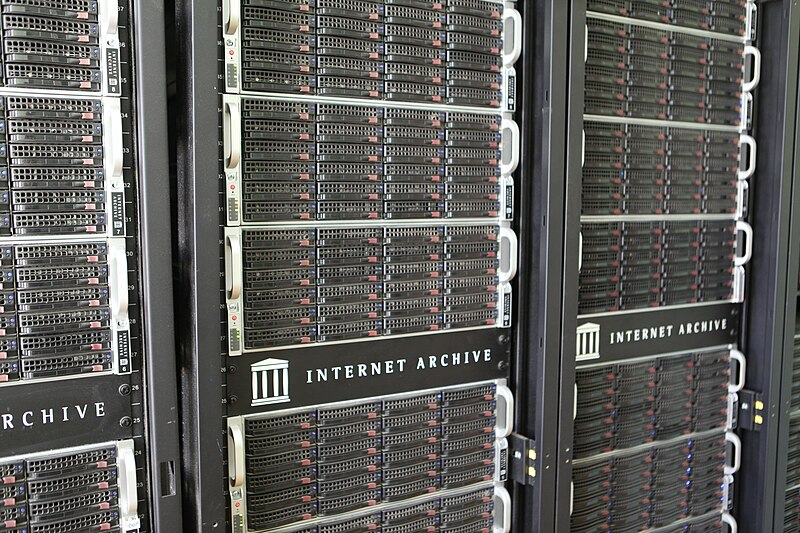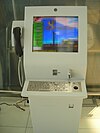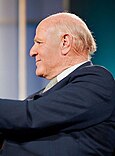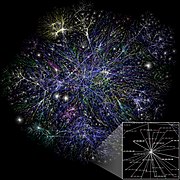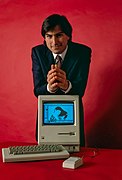Portal:Internet
The Internet PortalThe Internet (or internet) is the global system of interconnected computer networks that uses the Internet protocol suite (TCP/IP) to communicate between networks and devices. It is a network of networks that consists of private, public, academic, business, and government networks of local to global scope, linked by a broad array of electronic, wireless, and optical networking technologies. The Internet carries a vast range of information resources and services, such as the interlinked hypertext documents and applications of the World Wide Web (WWW), electronic mail, telephony, and file sharing. The origins of the Internet date back to research that enabled the time-sharing of computer resources and the development of packet switching in the 1960s which led to the design of computer networks for data communication. The set of rules (communication protocols) to enable internetworking on the Internet arose from research and development commissioned in the 1970s by the Defense Advanced Research Projects Agency (DARPA) of the United States Department of Defense in collaboration with universities and researchers across the United States and in the United Kingdom and France. The ARPANET initially served as a backbone for the interconnection of regional academic and military networks in the United States to enable resource sharing. The funding of the National Science Foundation Network as a new backbone in the 1980s, as well as private funding for other commercial extensions, encouraged worldwide participation in the development of new networking technologies and the merger of many networks using DARPA's Internet protocol suite. The linking of commercial networks and enterprises by the early 1990s, as well as the advent of the World Wide Web, marked the beginning of the transition to the modern Internet, and generated sustained exponential growth as generations of institutional, personal, and mobile computers were connected to the network. Although the Internet was widely used by academia in the 1980s, the subsequent commercialization in the 1990s and beyond incorporated its services and technologies into virtually every aspect of modern life. (Full article...) Selected article
An HTTP cookie is a parcel of textual information sent by a server to a World Wide Web browser and then sent back by the browser each time it accesses that server. HTTP cookies are used for user authentication, user tracking, and maintaining user-specific information such as site preferences and electronic shopping carts. Cookies have been of concern for Internet privacy, since they can be used for tracking the browsing of a user. As a result, they have been subject to legislation in various countries such as the United States, as well as the European Union. Cookies have also been criticised because the identification of users they provide is not always accurate and because they can be used for network attacks. Some alternatives to cookies exist, but have their own drawbacks. On the other hand, cookies have been subject to a number of misconceptions, mostly based on the erroneous notion that they are computer programs. Most modern browsers allow users to decide whether to accept cookies, but rejection makes some Web sites unusable.
Selected picture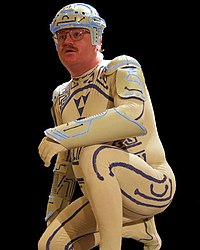 Jay Maynard is a computer programmer and system administrator. He is most famous for his electroluminiscent Tron Guy costume. He became an Internet phenomenon when his costume inspired by the movie Tron spread across the net from postings on Slashdot and Fark. News
Wikinews Internet portal
WikiProjects
Did you know (auto-generated) -
Selected biography
Barry Diller (born February 2, 1942 in San Francisco, California) is media executive responsible for the creation of Fox Broadcasting Company. Diller is currently the Chairman of Expedia and the Chairman and Chief Executive Officer of IAC/InterActiveCorp, an interactive commerce conglomerate and the parent of companies including ServiceMagic, Home Shopping Network, Ticketmaster, Match.com, Citysearch, LendingTree and CollegeHumor. In 2005, IAC/InterActiveCorp acquired Ask.com, marking a strategic move into the Internet search category. Diller has been on the board of The Coca-Cola Company since 2002. The new headquarters of IAC/InterActiveCorp was designed by Frank Gehry and opened in 2007 at 18th Street and the West Side Highway in Manhattan's Chelsea neighborhood. The western half of the block is dedicated to the building which stands several stories taller than the massive Chelsea Piers Sporting complex just across the West Side Highway. The extra floors guarantee a panoramic Hudson River view from Diller's top-floor office.
General images -The following are images from various internet-related articles on Wikipedia.
Selected quoteMore Did you know...
Main topics
Featured contentCategoriesRelated portalsThings you can do
Associated WikimediaThe following Wikimedia Foundation sister projects provide more on this subject:
Wikipedia's portals |

